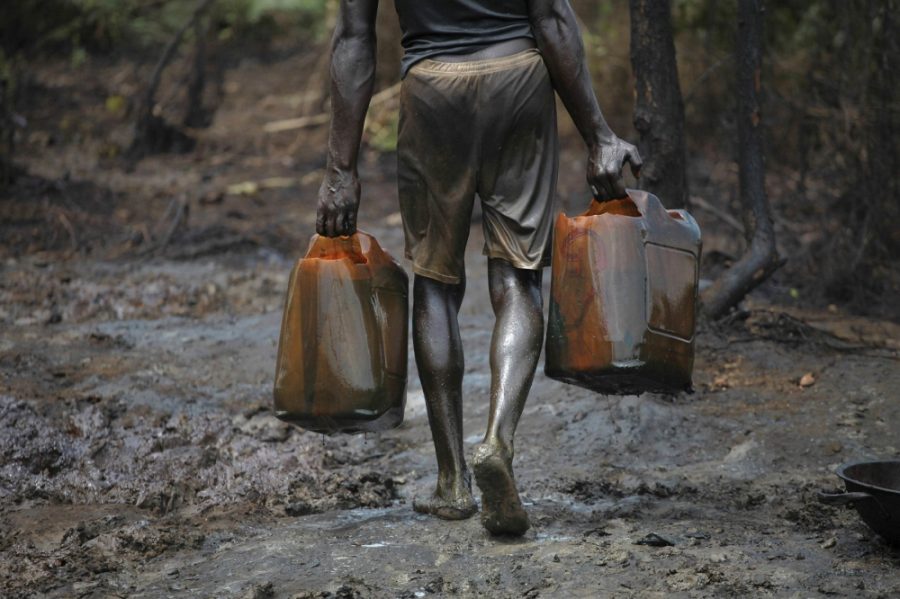The Nigerian Navy on Tuesday, December 17, 2019, disclosed that it has destroyed a total of 378 illegal refineries in Delta, Rivers and Bayelsa states in the last twelve months.
It said that 62 speedboats were impounded, while 275 suspects were arrested in connection with the operation of illegal refineries.
Ibok Ekwe Abas, the chief of Naval Staff, who made the disclosure during the end of the year media briefing to present the Navy’s scorecard for 2019, stated that a geo-spatial mapping of destroyed illegal refining sites revealed close proximity of the illegal refineries with crude oil pipeline networks, adding that in Delta, the criminal elements have continued to threaten national strategic infrastructures, in spite of ongoing operations and media campaigns.
According to the Chief of Naval Staff who was represented by the Navy Chief of Policy and Planning, rear admiral Bedroy Ibe-Enwo, a total of 70 large wooden boats were arrested for involvement in illegalities in 2019 and 463 large wooden boats were destroyed within the same period.
In his words, “Nigeria has a coastline of about 420nm and 200nm Exclusive Economic Zone, EEZ, translating to about 84,000 square nautical miles. Nigeria’s maritime area of interest includes the entire GoG which is about 574,800 square nautical miles and spans a total coastline of
about 2,874nm. The rich endowment of Nigeria’s maritime domain, its networks of oil and gas installations and associated shipping are threatened by maritime crimes such as piracy, sea robbery, crude oil theft, illegal oil bunkering, Illegal Unreported and Unregulated, IUU, Fishing, militancy and hostage taking”.
He continued that, “Nigeria relies on the sea for about 90 per cent of its import and export with oil being a major part of the trade. Hence, insecurity in Nigeria’s maritime domain becomes a major source of concern. In furtherance of its statutory mandate, the NN activated dedicated operations, in addition to routine operations. These operational activities are geared towards securing the maritime domain, a critical requirement for legitimate economic activities to thrive. Although these operations have contributed in enhancing maritime security with significant economic gains, it is imperative to sustain and possibly improve the level of security in order to optimize the potentials in the nation’s maritime domain.
“The maritime threats that have continued to significantly impact Nigeria’s maritime environment are piracy, smuggling, IUU fishing, crude oil theft and sea robbery. Piracy has continued to threaten maritime commerce in the GoG, particularly with the growing trend of kidnapping of ships’ crew for ransom. Although its menace has greatly reduced in Nigerian waters in 2019, it still negatively affects shipping costs and insurance premiums, which result in higher costs of goods, and shipping services.
“Smuggling is also another economic threat with perpetrators exploiting the vastness of Nigeria’s maritime environment to facilitate movement of contraband goods with ripple effects on local productivity. There is also the menace of IUU fishing which has adversely affected Nigeria’s economic prosperity, due to the gap in the capacity to monitor and control the maritime area. While the above threats have negatively impacted the optimization of the maritime potentials of the country, the most significant threat exists in the form of the crude oil theft, illegal refinery operation and kidnapping of crew for ransom. It is gratifying to note that, there has been significant reduction in crime in the nation’s maritime environment. This is largely attributable to a robust operational concept adopted by the NN”.
He added that “the NN has continued to focus on capacity development in order to improve maritime security in Nigerian waters, and the Gulf of Guinea, GoG. Capacities are deployed in consonance with the Total Spectrum Maritime Strategy, TSMS, which guides NN operational engagements. This concept of operation is based on a proactive layered response to 5 conflict spectrums characterised by distances to and from the coast.
The 3 operations command of the NN are organised to carry out maritime security operations as required by the strategy. The NN fleet has an array of ships and air platforms which are regularly rejuvenated in order to achieve a balanced mix of capabilities to meet threats amongst other commitments in the GoG region.







